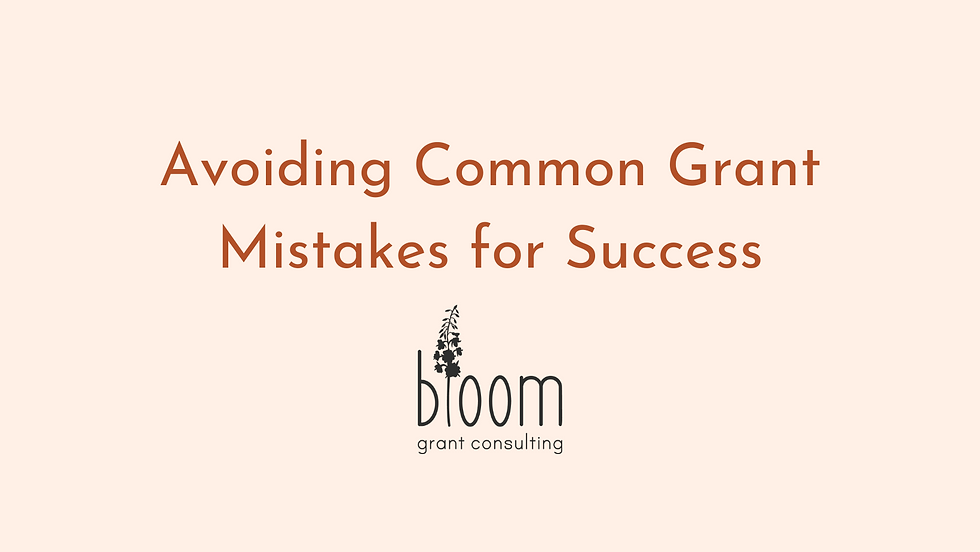- Jacquee Kurdas
- Oct 20, 2023
- 3 min read
Updated: Nov 11, 2024

Crafting a compelling grant application is a skill that can greatly impact the success of your nonprofit organization. However, even the most dedicated organizations can fall into common pitfalls that hinder their chances of securing funding. At Bloom Grant Consulting, we're committed to helping nonprofits excel in the grant-seeking process. In this blog post, we'll delve into the most common mistakes in grant applications and provide insights on how to avoid them.
Lack of Alignment with Funder's Mission
One of the most prevalent mistakes is submitting a proposal that doesn't align with the funder's mission and priorities. Funders want to support projects that resonate with their values, so tailoring your proposal to address their specific focus areas is essential. We recommend thoroughly research the funder's goals, review their past grants, and clearly demonstrate how your project aligns with their mission in your proposal.
Inadequate Research
Insufficient research into the funder's guidelines, application requirements, and preferences can lead to overlooked details and a lack of clarity in your proposal. This oversight can raise doubts about your organization's professionalism. It is critical that you carefully read the funder's guidelines, follow application instructions precisely, and ensure your proposal is well-structured and coherent.
Weak Project Description
A vague or poorly-defined project description can leave funders unsure about the impact your project will have. Without a clear understanding of your goals, they may question the feasibility of your proposal. It is very important to clearly outline your project's objectives, activities, expected outcomes, and how you'll measure success. Provide a well-thought-out timeline that demonstrates the project's progression.
Unrealistic Budgeting
An unrealistic budget can raise eyebrows and indicate a lack of understanding of your project's needs. Funders want to see a budget that aligns with your project's scope and provides a realistic breakdown of expenses. Be sure to develop a detailed budget that includes all project-related costs, along with supporting documentation and clear explanations for each expense.
Generic Proposals
Submitting a one-size-fits-all proposal to multiple funders can backfire. Each proposal should be tailored to the specific funder's priorities and requirements. Even if it's just a small adjustment, be sure to customize each proposal to address the funder's goals, language, and expectations. Highlight the unique aspects of your project that resonate with their mission.
Ignoring Evaluation and Impact Measurement
Failing to outline a clear plan for evaluating your project's success and measuring its impact can signal a lack of accountability and long-term planning. We recommend including a comprehensive evaluation plan that outlines how you'll measure progress and outcomes, and how you'll use the results to improve future projects.
Lack of Clarity and Proofreading
Grammatical errors, typos, and unclear language can negatively impact the readability and professionalism of your proposal. Proofread your proposal thoroughly, ensure clear and concise language, and consider having someone else review it for clarity and coherence.
Missed Deadlines
Missing submission deadlines can result in immediate disqualification, regardless of the quality of your proposal. Set reminders or create a timeline to ensure you have enough time to complete and review your proposal before the submission date.
Mistakes in grant applications are avoidable with careful planning, research, and attention to detail. At Bloom Grant Consulting, we emphasize the importance of crafting thoughtful, tailored proposals that align with funders' priorities and showcase your organization's professionalism and commitment. We work hard to avoid all of these mistakes to increase your chances of securing the funding your organization deserves.


